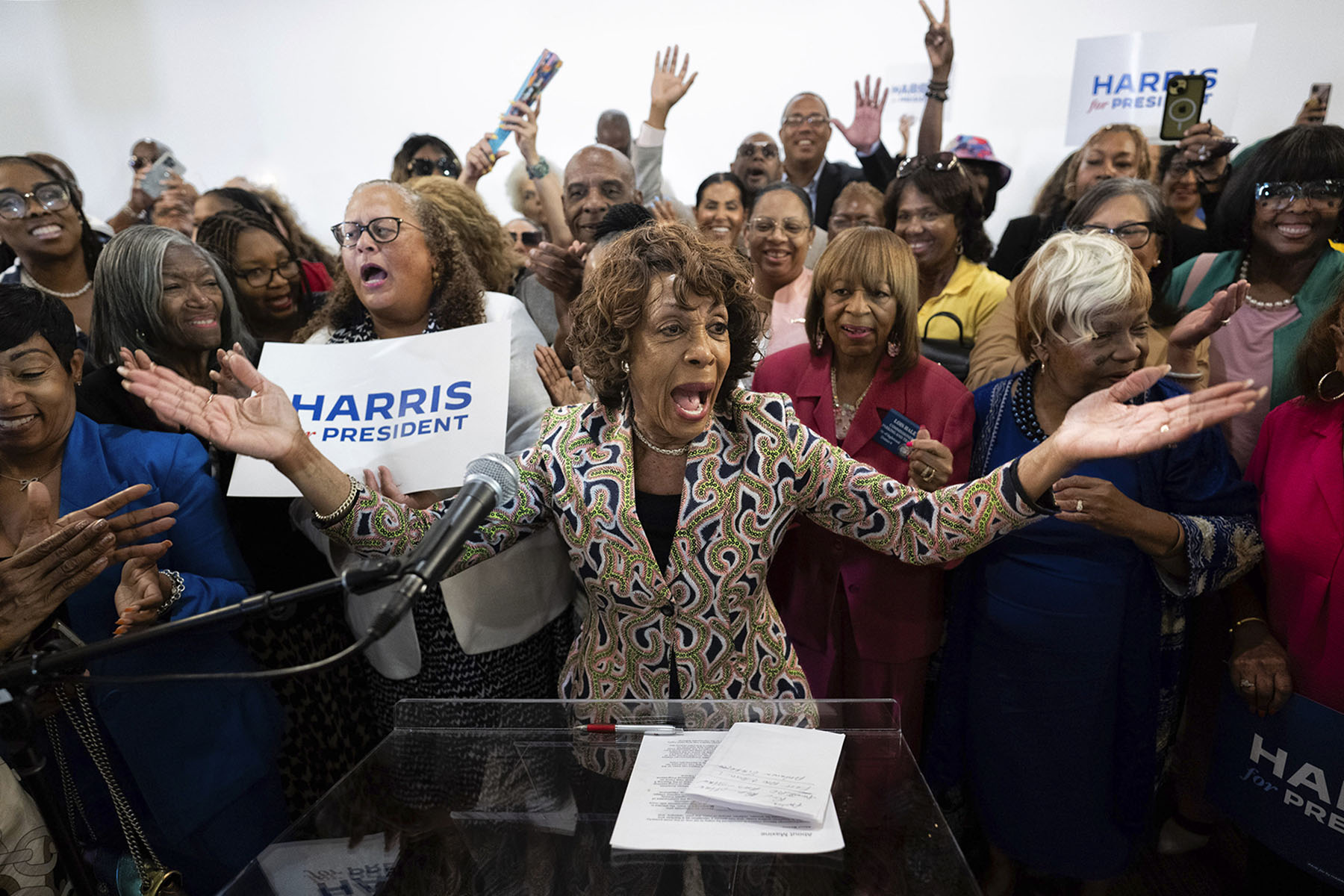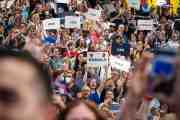Your trusted source for contextualizing Election 2024 news. Sign up for our daily newsletter.
Within a few hours of Vice President Kamala Harris launching her bid for the White House, 44,000 Black women raised $1.6 million dollars to fuel her campaign during a longstanding Sunday night Zoom meeting hosted by the organization Win With Black Women.
But that was only the start.
In the days that followed, organizers — largely, but not exclusively, women — convened call after call. On Tuesday and Wednesday, 7,500 Latinas joined two calls focused on organizing support for Harris. More than 9,000 women signed up for a two-hour Zoom on Wednesday targeted at South Asian women and about 4,000 people were on the call at any given time, raising close to $300,000. Then, on Thursday, White women — who make up the largest voting bloc by race and gender — assembled for the largest Zoom in the platform’s history with 164,000 participants; by Sunday, fundraising from that call topped $11 million, part of the $200 million overall raised by the Harris campaign in its first week of existence.
The organizers were explicit about drawing inspiration from the tremendous success Win With Black Women found. Their goal: to raise money and harness the newfound energy surrounding the presidential election, one that many organizers and attendees said they had struggled to feel before Harris’ ascent. Their tool: Zoom, the video calling platform made famous during the early days of the COVID-19 pandemic. Speakers made the case for Harris and encouraged listeners to donate money through other platforms and to otherwise get involved.
The week of Zoom calls — so packed that many attendees were turned away as organizers worked in real-time to expand the meetings’ capacities — underscored a fundamental shift among Democrats, who are now 99 days out from the November election, and the critical role that women will play in trying to build a winning coalition for Harris. (Zoom did not respond to a request for comment.)
-
Read Next:
“I was notified that a call was happening, and I’m going to guess that like so many of the thousands of people who are getting on these calls representing any number of communities of interest, that we’re all excited about the new opportunities here,” said New Mexico Gov. Michelle Lujan Grisham, who spoke to 4,500 Latinas who logged on Wednesday night, telling them she and other Latinas in New Mexico had their “foot on the gas” for Harris.
In the chat, hundreds of participants posted emojis of flags representing their ancestry — Mexican and Dominican flags, overwhelmingly — alongside coconuts and palm trees, which have become calling cards for Harris supporters online. Dozens of participants said they belonged to the informal group “Comadres con Kamala,” using a Spanish word that describes warm relationships among women, whether they’re close friends, godmothers or neighbors you might gossip with.
The energy was similarly effusive during Wednesday’s Zoom targeted at South Asian women — a call organizers had started planning only two days prior, after waking up to see just how much money Win With Black Women had raised.
Speakers included actress Poorna Jagannathan, who starred in the HBO series “The Night of” and the Netflix comedy “Never Have I Ever,” Los Angeles city council member Nithya Rama and Mini Timmaraju, the head of Reproductive Freedom for All. They pointed not only to their shared heritage with Harris, but also to policy issues women are more likely to prioritize, including abortion and child care.
“Culturally, I was raised to keep my head down and to not make a stir. I don’t know if people can relate to that, but that is the opposite of what Kamala Harris has done with her life. And I love her for that. And because of that strength in her, she’s going to become the next president,” actress and TV writer Mindy Kaling said during the call. “We know that it’s so important that thousands of us are on here for this one purpose: We need a federal protection for abortion. We don’t need tax cuts for billionaires. And that’s from someone who aspires to be a billionaire.”
Participants joining the call were welcomed with a short survey, including asking if their preferred election sustenance includes dosa, a South Indian dish Harris has made publicly, or dal, a lentil soup. The Zoom chat included jokes about the word “lotus” — a translation of Harris’ first name — rhyming with “POTUS,” the acronym for president of the United States. Organizers and speakers encouraged attendees to donate in denominations ending in “1” – $11, $101, or $1,001 — in reference to a Hindu tradition.
“My mother is in India, and she is just texting me nonstop. She’s sending me every meme that she is seeing on WhatsApp, and it is never-ending — about the fact that Kamala Harris is going to be our nominee for president and she will be the first Indian American Black woman president of our country,” Rep. Pramila Jayapal, a Washington Democrat and the first South Asian American woman elected to the House of Representatives, said on the call. “That is just an incredible thing to even think about, in terms of what it means for where we are as a country.”
Wednesday night’s call targeted at Latinas was also directly inspired by the success of Win With Black Women. The next morning, Democratic Rep. Nydia Velázquez of New York, who was born in Puerto Rico, picked up the phone and called Ingrid Duran and Catherine Pino, the leaders of PODER PAC, which raises money to elect Democrat Latinas to Congress. “It was 7 a.m. and she said, ‘Are you awake?’” Duran said in an interview with the 19th.
-
Read Next:
Velázquez told them Latina leaders should come together to rally support for Harris, like Black women had done the night before. “We mobilized immediately,” Duran added, calling Latina leaders in Congress, political organizing and the media. The roster of high-profile speakers included Julie Chavez Rodriguez, the campaign manager for Biden’s reelection bid who will stay on to manage Harris’ campaign; Rosario Dawson, who stars in “Ahsoka,” a TV series that is part of the “Star Wars” franchise; and Maria Hinojosa, the Mexican-American journalist.
During the call, Duran and Pino said, the excitement for Harris was palpable and different than what they saw in 2016, the last time Americans found themselves on the verge of electing a woman to the presidency with Hillary Clinton.
Speaking of Harris and her strong resonance among Latinas, Duran said, “She’s a daughter of immigrants She has broad appeal.”
Duran said she and other Latina leaders hope to keep harnessing last week’s enthusiasm with Zoom calls every Sunday. “There’s 15 Sundays between now and the election. So we’re committed to do this every Sunday,” she said.
Win With Black Women started as a weekly Sunday night call during the 2020 election cycle to discuss the treatment of Black women in American politics and has maintained that pace for four years now.
Shannon Watts, the founder of gun safety advocacy group Moms Demand Action, stepped away from the organization over a year ago and has since actively campaigned for the Biden-Harris ticket. She began working on Monday to rally White women for their own call, a desire to “pick up the baton” from Jotaka Eaddy, the founder of Win With Black Women. In multiple conversations with Eaddy last week, Watts and co-organizers Dr. Annie Andrews, Erin Gallagher and Liz Minnella asked how they can best mobilize White women, following the example set by women of color.
“I think it’s incumbent on White women to understand that they have this power,” Watts said. “I think that’s an important conversation to have, especially when we’re looking at someone like Donald Trump and JD Vance, who would uphold the patriarchy.”
Watts stressed that Thursday night’s “Answer the Call! Show Up for Kamala Harris” meeting that set new records for fundraising over Zoom “is just a one-off call. This is not an organization.” Rather, she said, the call charged White women to hold themselves accountable and be committed to sustained work to elect Harris — and check their own privilege.
“We White women so often vote against our own best interests, and especially against the interests of Black women. That is because White supremacism is in our own best interest,” she said.
-
Read Next:
“What has to change is the way we’re looking at the issues. It is just like with gun violence,” continued Watts, referring to the way that many White women enter the gun violence prevention movement out of concern over school shootings and lockdown drills — and only later learn about how gun violence disproportionately affects communities of color and expand their focus.
Queer advocacy groups also attracted over 20,000 participants and raised over $300,000 in two and a half hours via a call organized by the Human Rights Campaign’s “Out for Kamala Harris LGBTQ+ Unity,” held in conjunction with Equality California, the National LGBTQ Task Force Action Fund, and other groups.
And on Sunday, other organizers launched a Zoom called “Native Women + Two Spirits For Harris!”
Watts pointed to the fact that calls had organically emerged over the week among many groups as evidence of a need for diversity, inclusivity, and boundary-breaking beyond individual identity groups. “These calls are all happening, and then we come together as a coalition to elect Kamala Harris president,” Watts said.
More calls are planned for the second full week of Harris’s candidacy. Monday night will mark the inaugural meeting of White Dudes for Harris; planned speakers include Congressman Adam Schiff, singer Josh Groban, Secretary of Transportation Pete Buttigieg, author Scott Galloway and actor Josh Gad. As of Monday morning, it had over 70,000 registrants.
The first cross-coalition Women for Harris Zoom, organized by the Harris campaign, will also launch Monday.
On Tuesday, Caribbean-Americans for Harris and Filipino Americans for Harris will have their first Zoom meetings. On Friday, Disabled Voters for Harris will convene for the first time.
Wynton Wong and Jasmine Mithani contributed reporting.
Correction: An earlier version of this article misspelled Liz Minnella's name.







